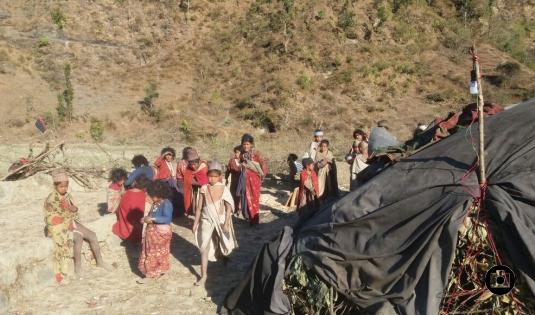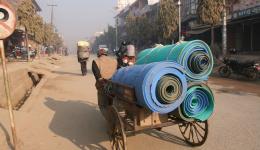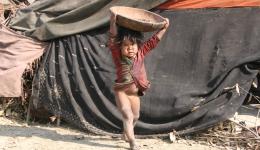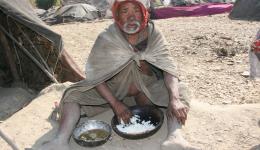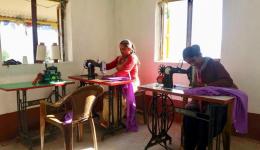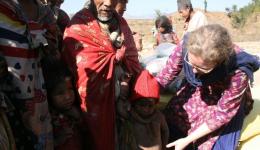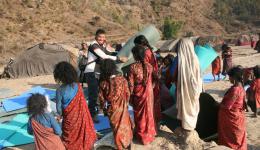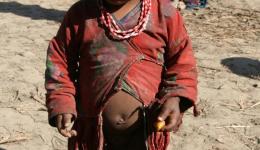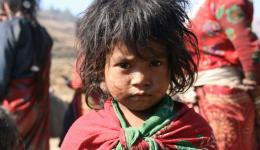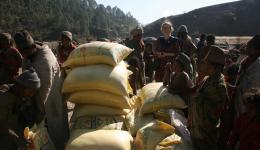Registered Nonprofit
Association for the Support
of Children and Needy
People Around the World
Unterstützung
Training workshops and nomadic tribe
Sun, Jan. 4, 2018 - 1:02pm, written by Katrin & Alexandra, published by Frank
Report from Nepal, part 2
The Raute tribe - Nepal’s last nomads
On Christmas Day, Katrin arrived in Kathmandu where she was picked up by our Nepalese friend Mingmar. The two were tackling an exhausting as well as exciting journey to the natural people which they had visited already in August to evaluate their needs.
For a long time, the Raute, one of the last nomadic tribe of Nepal, has been living entirely in and from nature. They have a lot of knowledge about how to survive. But even their life is affected by the constantly changing environmental conditions due to climatic changes and natural disasters.
The forests no longer offer the abundance of food as in previous years. In addition, the Raute are experiencing a high level of infant mortality, partly due to the lack of food as well as to inadequate clothing and poor hygiene, which all together leads to more diseases.
To help them endure the winter and the cold, but also to fight the causes of diseases, we had discussed with them in advance what are the necessary things that would help them most.
Rice, blankets, shoes, socks, scarves and the wonderfully warm and colorful caps of our knitting ladies were on the top of the list. From the experience gathered during the medical camps we knew that during the cold months many children suffer from otitis media as they lie with their heads on the bare, cold earth. Therefore, we added thermal mats that provide some protection and reflect the own body heat.
A special desire was expressed by women and girls for the installation of solar panels. The reason for this is quite understandable and it is not the first time our friends hear it in on their trips: When going to the toilet at night there is the danger of stepping on snakes or – especially in this area – of being attacked by wild animals like bears and wild cats. Usually, the animals are peaceful, however, when they feel threatened by people moving around in the dark, this can lead to dangerous or fatal situations. Children are even more hazard-prone since they must first learn how to deal with the dangers of the wild.
Experience report from Katrin:
"First of all, there were practical challenges in transporting things by bus. For the rice, there was no problem, as it would be without any major effort delivered by a rice supplier who also sells it at the destination. However, transporting the large package of blankets and solar cells was a major undertaking.
The thermal mats were to be purchased in the small town Birendranagar, the first bus stop of our journey.
It is a fundamental problem in Nepal that any trip or transportation of things is very expensive as there are no trains and the buses and roads are bad, the roads being very busy and stretching in long curves along the mountains. Many things are only available in Kathmandu and must be imported from India which increases the prices. The bus trip to our destination was scheduled to take 20 hours to a small town in the district Surkhet, an additional 7 hours’ drive by bus to the mountains into the village of Danimari and a two-hour walk to the nomad camp. The next day we had to do the last errands and then start the following morning. The huge package of blankets reached the bus station on the roof of the taxi and in this bus, everything fitted nicely into the trunk. Two large bags containing our luggage, our tents and sleeping bags as well as electrical material including solar cells was stowed inside.
One of the major problems for some Westerners on bus journeys in Nepal is that Nepalese seem to think that everybody loves loud music. If you are lucky it’s traditional music, if you are less fortunate it’s a kind of Nepalese modern Bollywood music with a lot of bass and matching music videos. Most of the time, the bus staff reacted to Katrin’s repeated request to reduce the volume. This was especially important after 10pm since sleeping in a shaky bus is already a certain challenge.
A practical argument in favor or loud music, however, is that the bus driver who often drives twenty hours without being replaced, is kept awake while driving. But we were lucky on this trip as there were two drivers taking turns.
The next afternoon Katrin and Mingmar arrive in Birendranagar and look for an accommodation to which they could transport their "belongings" by an auto riksha. It was planed that the nomadic chief whould arrive here today with two companions to choose together with us thermal mats and children’s clothes. Evening came, and nobody showed up, but then Mingmar received a message that the chief Surya Narayan was unable to travel because he had recently burned his hands in a fire in his tent and was therefore barely fit to travel.
The communication with the nomads took place by intermediary of the rice merchant. The chieftain visits him from time to time, borrows his cell phone and calls Mingmar. The Nepalese are generally very helpful to each other, so this is not a problem. With this news we changed our plan, because it would be helpful to have a few nomad parents when buying children’s clothes as they know best what is needed. Meanwhile it was already too late for shopping, because the shops were closed, and we had to leave early at 8am by bus to further into the mountains.
The next day we were at the bus station at 7:30am. We were the first ones, but the trunk was already full as the bus was transporting huge quantities of vegetables. So, we had to put all our luggage on the roof. It was quite a challenge to heft the ca. 1 square meter large package with the blankets on the roof of the bus. The first rope broke but finally we succeeded with great attention by all bystanders. The bus trip was just as exciting since there are only three buses a day and many people want to take the bus. It was jam-packed!
After a 7-hour drive on serpentines we arrived in the late afternoon in a small village in the mountains. As expected, everyone was very curious as to what we might do there. Foreigners rarely come to this part of Nepal as there are no tourist attractions. People are poorer than in other areas. Hardly anyone here speake English. It turned out difficult to visit the nomads discretely to avoid them too much unwanted attention.
Our first plan was for the nomads to pick us up on our arrival by bus and take us to their camp. But as it would be already dark on the way, it was too late for them to undertake the 2-hour walk as well as the march back. So, we decided to spend the night in a «pension» which means a small room rented by a family. There was no running water, all washing had to be done with water – of course cold water – from a large tub which was filled up twice a day at a watering place.
The next morning, when we woke up, some nomads had already arrived to accompany us. They were very reserved. We invited them for a little breakfast: noodle soup and tea. The crowd of people watching us was even bigger than the night before.
Afterwards, the blankets and other items we had brought along were packed the nomadic way and ready for transport, i.e. everything was wrapped in the nomadic cloths with which they are used to regularly transport their belongings over long distances.
Before leaving, socks and scarves were bought. Then we set out on trails over the mountainous landscape, across fields and finally along a riverbed. As Katrin had already noticed on the bus trip, that a lot of forest was cut down in this area, much more than usual in Nepal.
When we reached the camp about two hours later, we saw a mountain of rice sacks hat Mingmar’s rice supplier had already delivered the night before. The children were climbing on it and sitting on the top. They curiously touched and examined the gifts we brought along, e.g. the sack full of knitted caps.
First, we realized that we were not the only ones who had come. Because Westerners rarely «get lost» here and there is not much else going on, many Nepalese villagers found this event most interesting and came to visit the camp and curiously watched what was going on.
The chief was given ointment and painkillers that should improve his condition within the next few days.
First, the rice sacks were distributed. Every family was to receive 50 kg, to ensure their basic food supply for at least a few months. Thankfully, every family took a sack. Since the rice supplier had delivered sacks of different sizes, there was a lot left over. This was divided into small portions by the women by means of a large spoon-like wooden utensil. The women carefully wrapped the portions in their cloths and brought them to the tents.
The distribution of the caps to the children was as always a special pleasure, because the nomads generally only possess the most necessary clothes. The little children were very shy. The contact with a «fair skinned» woman was apparently a bit scaring. The women were rather curious, they discussed about Katrin’s hair and compared it to theirs. The Raute women traditionally wear wide, homemade necklaces made of many small colored pearls. They wondered why Katrin did not also wear some.
Mingmar then went on to install the two solar cells.
As always, he was watched by all children and adults in this exciting work. He explained to a few young nomads who knew Nepalese how the solar cells work and how to connect them to the battery. After all, they will have to be able to remove and reassemble them themselves when they will move.
Accompanied by three young nomads we made our way back to the village. After two hours uphill walking we arrived there and said goodbye the next day.
We still fulfilled the desire of our new friends for shoes. Then we started again by jeep to Dailekh and from Dailekh with another car back to Birendranagar where we spent a relaxing night with shower and in the morning took the bus to Kathmandu.
The next day, Mingmar told Katrin that the chief had called him and apologized for not having been able to take good care of us because he felt so sick. Apparently, the ointment and the tablets had already brought him some relief. He said that he would have liked to give flowers to the friends, but there were none available in nature and he also did not have a scarf to hand over to guests as usual in Nepal. However, he wanted to let us know that all his people are very happy about the support."
THANKS to ALL friends who made it possible to make these people happy ...
Mon, Jan. 29,.2018 - 7:25, written by Katrin & Alexandra, published by Frank
Report from Nepal, part 1
Shortly before Christmas Katrin set off again for Nepal. Together with our friend Mingmar they will visit two places.
When during the second part of the trip, Katrin and Mingmar visited the workshop built by FriendCircle WorldHelp for people who less than two years ago had been living on the edge of society - without enough water, food and work - one of the women gave a moving speech:
"We are very satisfied and can now live our lives independently. This makes us happy. However, we are even more happy when you visit us! We have learned from you that it is good when better-off people help those in need. With your help we could even save 30,000 rupees (240 euros) from the earnings. We want to donate this amount to sick and old people. Your support will also help many people of the next generations. Even now, young people come to us and learn here or can make their own things (clothes, dishes, etc.) and repair. We thank you very much. "
Also from the perspective of the visitors, the workshop is running very well and jointly by all. The working people share the profit in a fair way among themselves, so that part of the profit goes to the families and another part goes into a community fund. New material is financed from this and the manufactured products are sold on the market. A particularly sustainable way of doing business ...
THANKS to ALL friends of FriendCircle WorldHelp - it's great to see the development of a village which two years ago was at the limit of its subsistence level ...
